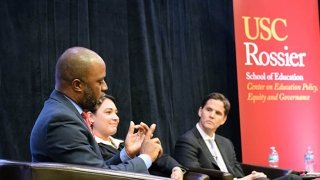In a wide-ranging discussion, candidates for California state superintendent of public instruction spoke to their visions for education policy in a March 19 forum at USC.
Hosted by USC Rossier’s Center on Education Policy, Equity and Governance (CEPEG) and by Policy Analysis for California Education (PACE), the three candidates for the state’s top education position talked about state funding, teacher shortages and school accountability issues.
About 200 attendees packed the USC Radisson to hear from Lily E. Ploski, former dean at Solano Community College; Tony Thurmond, a state assemblyman; and Marshall Tuck, educator-in-residence at the New Teacher Center. KPCC reporter Adolfo Guzman-Lopez moderated the event.
The forum marked the official launch of CEPEG, one of USC Rossier’s newest research centers and the only center focused exclusively on K-12 policy issues. The center advocates for partnerships with local leaders to make research accessible and useful, while training new generations of scholar to advance equity.
“It’s this kind of open dialogue,” said Dean Karen Symms Gallagher at the outset of the event, “not only with one another on the issues, but also with us, on our concerns, with students and parents and experts and citizens alike—this is essential for achieving our shared goal of improving schools and strengthening our society.”
A new agenda for California
The current state superintendent, Tom Torlakson, will leave office at the end of the year due to term limits.
Vying to be his replacement, the candidates looked for subtle ways to differentiate themselves in a cordial atmosphere.
When Guzman-Lopez asked about the California School Dashboard, the online school accountability tool that is popular among parents, no candidate opposed it—but Thurmond thought it needed to incorporate voter feedback, and Ploski thought it needed to provide more information. A USC Rossier/PACE poll conducted in January found California parents and voters in general supported many aspects of the dashboard.
No candidate voiced direct opposition to the Local Control Funding Formula, but all thought the base level of funding needed an increase, with Ploski and Thurmond both calling for better fiscal training of district leaders.
Candidates also answered Guzman’s questions about their biggest perceived flaws.
Responding to concerns that he’d be easy on charter school managers, Tuck, the former co-founder of Green Dot public schools—a charter network—said that no fraud would be tolerated in any school, and that what mattered was, “How do we have a great school for all kids?”
Thurmond, meanwhile, addressed the criticism that he’d be beholden to teacher unions by pointing out he has disagreed with them, too, such as on the issue of school start times. He also noted the support given to him by other groups, saying that he was not in anybody’s pocket.
And Ploski brandished her record as a former dean of a large school, her experience managing 150 direct reports and her time spent on statewide boards as proof she would be able to lead California’s education system.
Closing out the forum, David N. Plank, executive director of PACE, said he sees CEPEG becoming a powerful voice for change within Los Angeles and the state.
“I think these kinds of forums are extraordinarily informative for all of us as we make choices for children in California,” Plank said.



